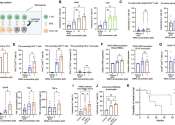Antibiotics reveal a new way to fight cancer
Cancer cells grow and spread by hiding from the body's immune system. Immunotherapy allows the immune system to find and attack hidden cancer cells, helping cancer patients live longer lives. However, many patients get little ...
Apr 16, 2024
0
63









